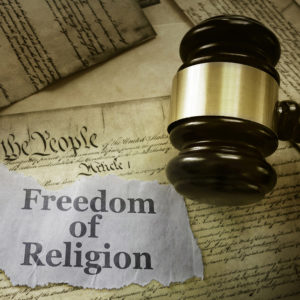Faith and prayer have been part of American military members’ lives since our great nation was founded.
When George Washington was not yet our president, and was merely commander in chief of the Continental Army that hoped to carve out a new nation, one of his first acts was to create the Chaplain Corps to attend to the spiritual wellbeing of his troops. One reverend on the ground once observed that Washington “rode around among his army yesterday and admonished each one to fear God.”
When America won its independence, Washington prayed for its citizens to display “charity, humility and pacific temper of mind, which were the characteristics of the Divine Author of our blessed religion, and without a humble imitation of His example in these things, we can never hope to be a happy nation.”
Prayer was a constant theme during our Civil War. Just weeks before his assassination, President Abraham Lincoln created the VA’s Chaplain Service to ensure a staff that could attend to the spiritual needs of veterans.
Faith gave Lincoln the courage to issue the Emancipation Proclamation. He told his Cabinet he made a vow that “if God gave us the victory in the approaching battle, he would consider it an indication of Divine will, and that it was his duty to move forward in the cause of emancipation.”
During World War II, Gen. George Patton openly worried whether his men were praying as much as they should. When told they were not, Patton said, “There are three ways that men get what they want: by planning, by working, and by praying.”
Patton believed God was the great unknown in the wars of men. “That unknown spells defeat or victory, success or failure,” he said. “Some people call that getting the breaks; I call it God. God has His part, or margin, in everything. That’s where prayer comes in.”
At the Department of Veterans Affairs, we know that faith is an integral part of war and the healing process that follows.
That’s why we’re moving to eliminate the double standard that faith-based groups currently face, a double standard that has the unfortunate effect of making some of these groups hesitant to help our veterans.
Under a rule, faith-based organizations were subjected to additional scrutiny if they sought grant funding to support veterans. They faced burdens that secular groups didn’t, including an obligation to offer voluntarily to find veterans secular alternatives — thereby undermining their own efforts.
This rule not only made it harder for veterans to find the holistic healing they seek, it was a hurdle that discouraged some faith organizations from participating in VA programs.
Those days are about to end. Revising this rule will end discrimination against religious organizations and increase the number of programs for veterans.
We’re thankful to President Trump for directing this change through his Executive Order on religious liberty. We’re also proud that VA is moving in this same direction on its own.
Last year, we struck down a policy that prevented veterans from leaving Bibles or other religious items on public display tables that celebrate the lives of our veterans.
Today’s culture of fake outrage calls these items “offensive” and demands their removal. But it is veterans who deserve to take offense — veterans whose faith compelled them to serve this nation, and in many cases played an important role in their recovery from the wounds they suffered on our behalf.
In 1944, the night before the first American troops would land in occupied France, Gen. Matthew Ridgway couldn’t sleep, and consoled himself with prayer. He listened for the promise God made to Joshua: “I will not fail thee, nor forsake thee.”
The VA will not forsake our heroes. We’re proud to improve a misguided rule that only made it harder for veterans to receive those things that are so effectively delivered by faith: strength, healing and hope.

